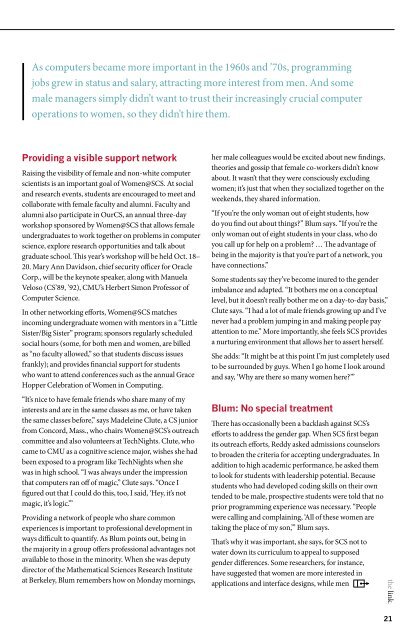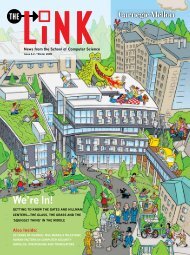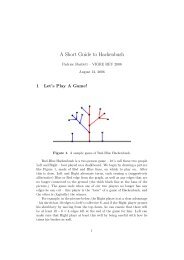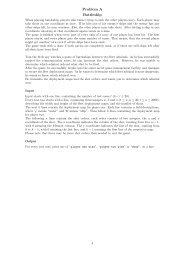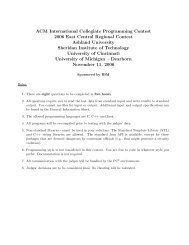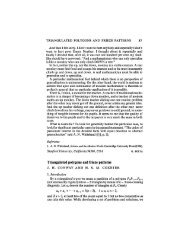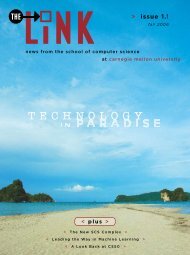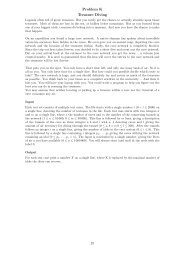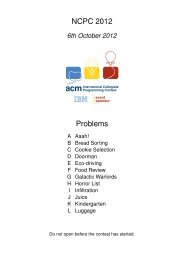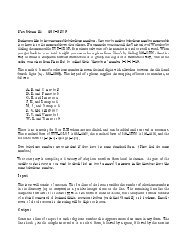Download now (1.3MB, PDF reader required) - Link home page
Download now (1.3MB, PDF reader required) - Link home page
Download now (1.3MB, PDF reader required) - Link home page
Create successful ePaper yourself
Turn your PDF publications into a flip-book with our unique Google optimized e-Paper software.
As computers became more important in the 1960s and ’70s, programming<br />
jobs grew in status and salary, attracting more interest from men. And some<br />
male managers simply didn’t want to trust their increasingly crucial computer<br />
operations to women, so they didn’t hire them.<br />
providing a visible support network<br />
Raising the visibility of female and non-white computer<br />
scientists is an important goal of Women@SCS. At social<br />
and research events, students are encouraged to meet and<br />
collaborate with female faculty and alumni. Faculty and<br />
alumni also participate in OurCS, an annual three-day<br />
workshop sponsored by Women@SCS that allows female<br />
undergraduates to work together on problems in computer<br />
science, explore research opportunities and talk about<br />
graduate school. This year’s workshop will be held Oct. 18–<br />
20. Mary Ann Davidson, chief security officer for Oracle<br />
Corp., will be the keynote speaker, along with Manuela<br />
Veloso (CS’89, ’92), CMU’s Herbert Simon Professor of<br />
Computer Science.<br />
In other networking efforts, Women@SCS matches<br />
incoming undergraduate women with mentors in a “Little<br />
Sister/Big Sister” program; sponsors regularly scheduled<br />
social hours (some, for both men and women, are billed<br />
as “no faculty allowed,” so that students discuss issues<br />
frankly); and provides financial support for students<br />
who want to attend conferences such as the annual Grace<br />
Hopper Celebration of Women in Computing.<br />
“It’s nice to have female friends who share many of my<br />
interests and are in the same classes as me, or have taken<br />
the same classes before,” says Madeleine Clute, a CS junior<br />
from Concord, Mass., who chairs Women@SCS’s outreach<br />
committee and also volunteers at TechNights. Clute, who<br />
came to CMU as a cognitive science major, wishes she had<br />
been exposed to a program like TechNights when she<br />
was in high school. “I was always under the impression<br />
that computers ran off of magic,” Clute says. “Once I<br />
figured out that I could do this, too, I said, ‘Hey, it’s not<br />
magic, it’s logic.’”<br />
Providing a network of people who share common<br />
experiences is important to professional development in<br />
ways difficult to quantify. As Blum points out, being in<br />
the majority in a group offers professional advantages not<br />
available to those in the minority. When she was deputy<br />
director of the Mathematical Sciences Research Institute<br />
at Berkeley, Blum remembers how on Monday mornings,<br />
her male colleagues would be excited about new findings,<br />
theories and gossip that female co-workers didn’t k<strong>now</strong><br />
about. It wasn’t that they were consciously excluding<br />
women; it’s just that when they socialized together on the<br />
weekends, they shared information.<br />
“If you’re the only woman out of eight students, how<br />
do you find out about things” Blum says. “If you’re the<br />
only woman out of eight students in your class, who do<br />
you call up for help on a problem … The advantage of<br />
being in the majority is that you’re part of a network, you<br />
have connections.”<br />
Some students say they’ve become inured to the gender<br />
imbalance and adapted. “It bothers me on a conceptual<br />
level, but it doesn’t really bother me on a day-to-day basis,”<br />
Clute says. “I had a lot of male friends growing up and I’ve<br />
never had a problem jumping in and making people pay<br />
attention to me.” More importantly, she feels SCS provides<br />
a nurturing environment that allows her to assert herself.<br />
She adds: “It might be at this point I’m just completely used<br />
to be surrounded by guys. When I go <strong>home</strong> I look around<br />
and say, ‘Why are there so many women here’”<br />
blum: no special treatment<br />
There has occasionally been a backlash against SCS’s<br />
efforts to address the gender gap. When SCS first began<br />
its outreach efforts, Reddy asked admissions counselors<br />
to broaden the criteria for accepting undergraduates. In<br />
addition to high academic performance, he asked them<br />
to look for students with leadership potential. Because<br />
students who had developed coding skills on their own<br />
tended to be male, prospective students were told that no<br />
prior programming experience was necessary. “People<br />
were calling and complaining, ‘All of these women are<br />
taking the place of my son,’” Blum says.<br />
That’s why it was important, she says, for SCS not to<br />
water down its curriculum to appeal to supposed<br />
gender differences. Some researchers, for instance,<br />
have suggested that women are more interested in<br />
applications and interface designs, while men<br />
the link.<br />
21


